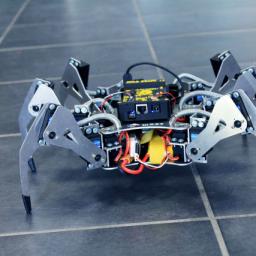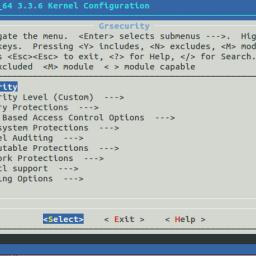
Erle Robotics has launched an Indiegogo crowdfunding campaign for what it claims is the "first smart robotic spider powered by Snappy Ubuntu Core". Developers can create apps using the open source Robot Operating System (ROS), and distribute/sell them through Erle Robotics' apps store. The six-legged "spider" weighs just over 2 kilograms (4.4lbs) and has 45 minutes of autonomy. Powering the system is a 900MHz quad-core ARM Cortex-A7 CPU with 1 GB of RAM; the Erle-Spider comes with a
gravity sensor, gyroscope, digital compass, pressure sensor, and temperature sensor. "This robot provides connectivity through Bluetooth, Wi-Fi, 3G and 4G networks, etc. then the people can control it through their mobile phones, joysticks, laptops, tablets, etc. and this can even act as a hot spot for Wi-Fi".
Options include a basic kit for about 250 ($400), and an assembled version for around 420 ($640). But oddly, there doesn't seem to be an option to add two extra legs to convert this "spider" from a hexapod into an actual arachnid.

The gurus behind the popular and respected Linux kernel hardening effort Grsecurity will
stop providing their stable patches to the public. In future, only paying sponsors will get access to stable patches to shore up their kernels' defenses. The test series, unfit for production use, will however continue to be available, to avoid impacting the Gentoo Hardened and Arch Linux communities. The project's
full source code will still be released to the public at large, but non-sponsors will have to pick through every update to find out what's applicable to them.
The whole situation stems from WindRiver, a subsidiary of Intel, which "has been using the grsecurity name all over its marketing material and blog posts to describe their
backported, unsupported, unmaintained version in a version of Linux with other code modifications that haven't been evaluated by us for security impact." After spending several thousand on legal fees, faced with "a huge legal team, the capability to drag out the case for years" and a threat to request "all available sanctions and attorneys' fees" were the lawsuit to proceed against them, Grsecurity decided pursuing the case through the courts was not practical.
 Erle Robotics has launched an Indiegogo crowdfunding campaign for what it claims is the "first smart robotic spider powered by Snappy Ubuntu Core". Developers can create apps using the open source Robot Operating System (ROS), and distribute/sell them through Erle Robotics' apps store. The six-legged "spider" weighs just over 2 kilograms (4.4lbs) and has 45 minutes of autonomy. Powering the system is a 900MHz quad-core ARM Cortex-A7 CPU with 1 GB of RAM; the Erle-Spider comes with a gravity sensor, gyroscope, digital compass, pressure sensor, and temperature sensor. "This robot provides connectivity through Bluetooth, Wi-Fi, 3G and 4G networks, etc. then the people can control it through their mobile phones, joysticks, laptops, tablets, etc. and this can even act as a hot spot for Wi-Fi".
Erle Robotics has launched an Indiegogo crowdfunding campaign for what it claims is the "first smart robotic spider powered by Snappy Ubuntu Core". Developers can create apps using the open source Robot Operating System (ROS), and distribute/sell them through Erle Robotics' apps store. The six-legged "spider" weighs just over 2 kilograms (4.4lbs) and has 45 minutes of autonomy. Powering the system is a 900MHz quad-core ARM Cortex-A7 CPU with 1 GB of RAM; the Erle-Spider comes with a gravity sensor, gyroscope, digital compass, pressure sensor, and temperature sensor. "This robot provides connectivity through Bluetooth, Wi-Fi, 3G and 4G networks, etc. then the people can control it through their mobile phones, joysticks, laptops, tablets, etc. and this can even act as a hot spot for Wi-Fi".